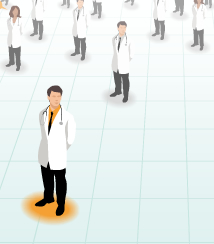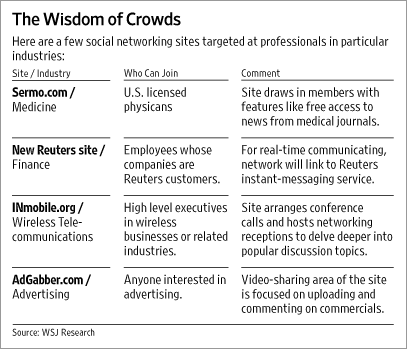Sermo a sign of a larger trend toward specialized social networks
Jessica Vascellario has written an interesting piece at the Wall Street Journal: Social Networking Goes Professional. It describes a professional social network for doctors called Sermo.com, where doctors share information on treatments, diagnoses, and other medical topics.

The Sermo demo video (worth watching) asks “Why consult one colleague when you could consult thousands?”. Of course, to ask this is to assume that all of those thousands of colleagues actually know what they’re doing: they’re not fraudulent doctors who make stuff up. The way Sermo solves this is by verifying every doctor who signs up against a database of licensed physicians…so it is open to anybody, as long as you’re a real doctor. This will help to keep the system at some basic level of professionalism.
Jessica Vascellario has written an interesting piece at the Wall Street Journal: Social Networking Goes Professional. It describes a professional social network for doctors called Sermo.com, where doctors share information on treatments, diagnoses, and other medical topics.

The Sermo demo video (worth watching) asks “Why consult one colleague when you could consult thousands?”. Of course, to ask this is to assume that all of those thousands of colleagues actually know what they’re doing: they’re not fraudulent doctors who make stuff up. The way Sermo solves this is by verifying every doctor who signs up against a database of licensed physicians…so it is open to anybody, as long as you’re a real doctor. This will help to keep the system at some basic level of professionalism.
Sermo is a sign of a larger trend: the move to smaller, more specialized social networks that have custom tools to support a unique activity and may cater to a private or exclusive set of users. In this case it is sharing medical information among verified doctors. But there are many other specialized networks being built, as the journal’s graphic depicts:

My hunch is that we’ll see a lot more specialized social networks coming soon. They’ll support a unique activity and user group in ways that generic software can’t, as well as provide the appropriate privacy and membership tools to keep them high quality and relevant.
Update: Several folks have pushed back on the idea that these sites are anything new…or anything beyond the forums of the 90s. The difference is that they are now social web applications, offering tools to rate, review, track, and otherwise record various parts of activities that we didn’t have before. Another big difference is that some are person-centric as opposed to topic-centric (as in forums), so different relationships are formed, you can make connections, friend someone, follow someone, etc. All of these services are slightly different, however, but I do believe there is a general trend…